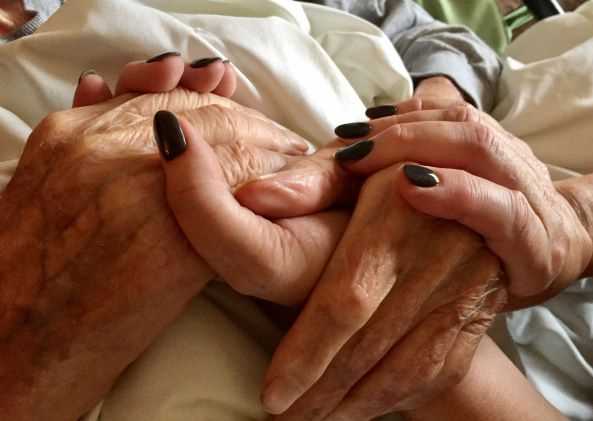“Grief never ends…but it changes.
It’s a passage, not a place to stay.
Grief is not a sign of weakness, nor a lack of faith…
It is the price of love.” – Anonymous
As a client of Reka’s, I thought sharing my most recent experience with grief could be helpful, maybe even insightful, for others. Life has changed immensely for my wife and me since my mother-in-law’s passing nine months ago, which brought with it a myriad of lessons. I hope that my story can offer a ray of light for people learning to cope after loss.
Grief. Bereavement. Mourning. These are all words used to describe the process and emotions associated with the loss of a loved one. For those grieving, it can be a whirlwind of fluctuating feelings that are unpredictable, sudden, and drastic. When we’re in this lamenting state, it’s often challenging to know what we need or want – and it can be even trickier to know how to support your grieving partner.
The key thing to keep in mind is that everyone reacts to grief differently and in their own way. We’re all uniquely wired, shaped by our experiences and our biology. Although there are many theories about the grieving process, there isn’t a clear-cut path to healing the vacancy in our hearts; it’s subjective, personal, and takes time. As nebulous and all-encompassing as grief may be, we do have a choice in how we grieve. For example, we can choose to let it be debilitating, paralyzing us in bed for days or weeks on end. Or, we could decide to do the opposite, utilizing our willpower to get us through. Whichever route we take, it’s important to honor where we are in our own bereavement process and where our partner is in theirs.
Since meeting almost six years ago, Regina and I have experienced numerous losses together. We’ve mourned the loss of friends, family members, and pets…but nothing hit as hard as my mother-in-law’s unexpected passing last June. In the days following, there were waterfalls of tears coupled with moments of acceptance. Emotions and moods changed with the drop of a hat, yet we weren’t completely incapacitated. When I feel down, I tend to want to hibernate and shut out the rest of the world for a bit. In Regina’s no-nonsense business mind, there isn’t time for that. Yes, of course she feels and experiences the range of human emotions, but she doesn’t stew on things. She just isn’t built like that. Life still goes on! To illustrate this point, Regina was handling work issues and scheduling while on our way to her mother’s service. She made the choice to allow herself to grieve and feel all the feelings, but to not let it annihilate her mentally, physically, and emotionally. She is also highly self-aware, which helps tremendously with bereavement. Knowing what we want or need in times of distress is a rare and admirable quality.
Through this experience and many others, I’ve learned more about the vital role of communication. As a wife trying to support her spouse, I was unsure how to navigate my own grief around losing my mother-in-law. I had my daily ups and downs, Regina had hers, and we had our collective emotional waves. There was no rhyme or reason to it. It was entirely organic. A combination of our individual and coupledom grieving processes emphatically pushed us to be even more emotionally present with one another. We learned to go with the flow. We adapted. We honored each other’s feelings and needs by talking about them, which helped us to stay connected through a rather painful time.
With each passing day, we learned more about our grief and each other. We laughed, cried, and spent time together and with family and friends. We paid attention to signs and messages from other realms. We actually deepened our spirituality and our connection to nature. While cleaning out Regina’s mother’s apartment, we noticed a dragonfly theme – pictures, trinkets, purses – all with dragonflies painted, drawn, or embroidered on them. Interestingly, we began seeing dragonflies more frequently. We saw them in our yard, on hikes, while driving – it seemed that they were everywhere we were. It wasn’t a coincidence; it was Regina’s mother making her presence known. We’ve remained open and receptive to connecting with her mother in a different form, which is comforting for us going forward.
These are just a few examples of how we’ve learned to simultaneously honor and manage our grief. You and your partner’s path may look very different, which is perfectly okay. Regardless of the route you take, here are some tips to keep in mind throughout the healing journey:
- Let yourself and your partner grieve. It’s important for both of you to make time to grieve in your own ways. If we ignore or repress our grief, we may experience physical or mental health issues.
- Take a grieving break. Just as it’s crucial to grieve, it’s also vital to take breaks from grieving. Laughing, watching a movie, meeting up with friends, and exercising are all healthy ways of integrating grief.
- Be patient. Your grieving process may differ greatly from your partner’s. Remain calm, gentle, and empathetic when interacting with your spouse.
- Communicate. Talking about things is the cornerstone of any healthy relationship – and it’s particularly essential for those in mourning. Listen to your partner, check in with them, and allow them to have their own emotional experience around the loss.
Grief isn’t an easy concept to fully understand, let alone manage. There’s no specific timeline indicating when we’ll feel better after a loss nor is there one pathway to healing. Grief is subjective, nonlinear, and cyclical. With time, love, and support from our partners and loved ones, we can begin to accept our new reality.
Sending healing vibes your way, I


